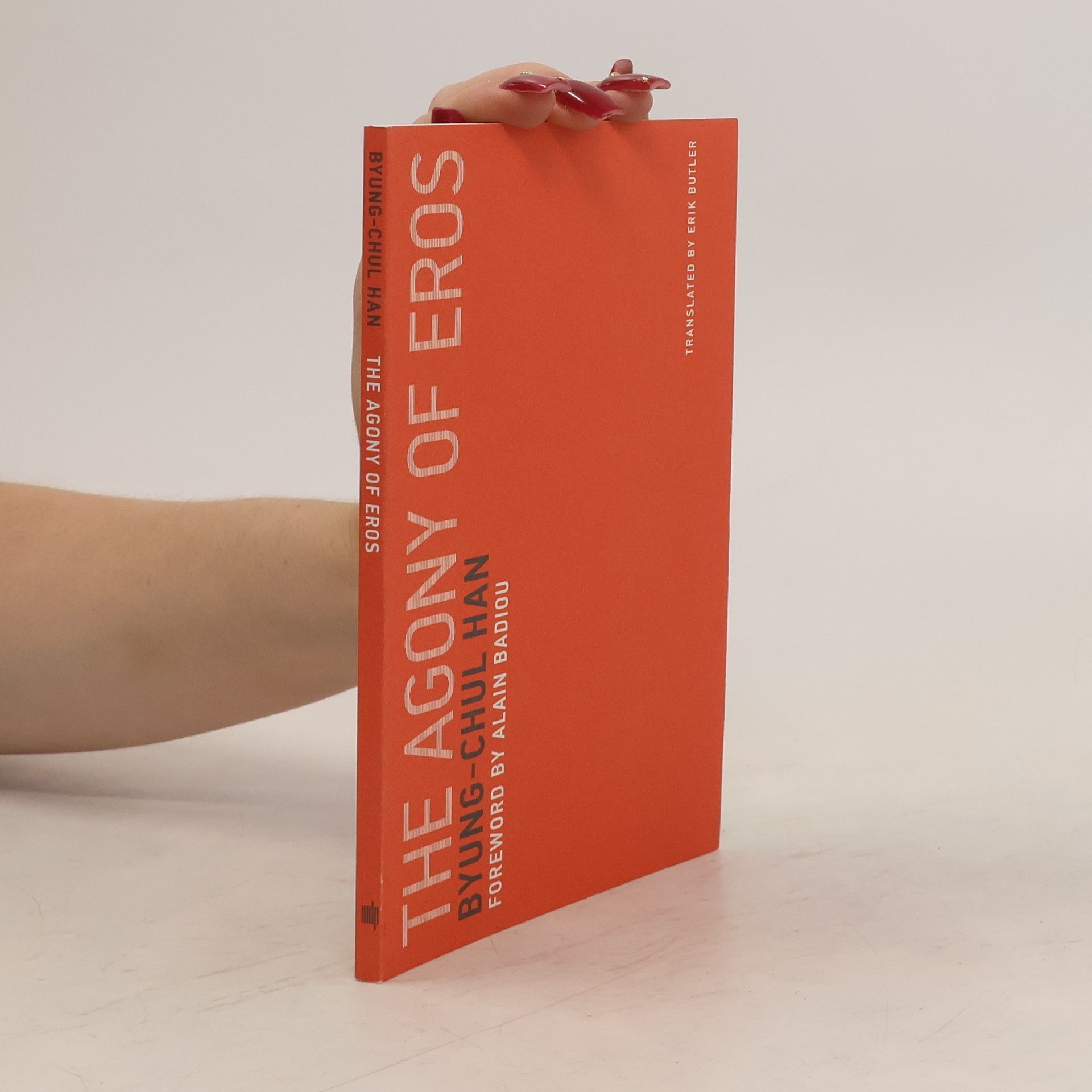Topology of violence
- 168pages
- 6 heures de lecture
Cette série d'essais puise profondément dans la philosophie et la théorie pour disséquer un large éventail de sujets culturels. Elle examine la société contemporaine à travers le prisme du numérique, de l'érotique et des structures de pouvoir. Les textes provocateurs offrent des perspectives nouvelles sur la littérature, l'écriture commerciale et les passions humaines complexes. C'est une exploration de vérités opportunes d'une manière souvent prématurée.






Byung-Chul Han is one of the most widely read philosophers in Europe today, a member of the new generation of German thinkers that includes Markus Gabriel and Armen Avanessian. In The Agony of Eros, a bestseller in Germany, Han considers the threat to love and desire in today's society. For Han, love requires the courage to accept self-negation for the sake of discovering the Other. In a world of fetishized individualism and technologically mediated social interaction, it is the Other that is eradicated, not the self. In today's increasingly narcissistic society, we have come to look for love and desire within the inferno of the same. Han offers a survey of the threats to Eros, drawing on a wide range of sources -- Lars von Trier's film Melancholia, Wagner's Tristan und Isolde, Fifty Shades of Grey, Michel Foucault (providing a scathing critique of Foucault's valorization of power), Martin Buber, Hegel, Baudrillard, Flaubert, Barthes, Plato, and others. Han considers the pornographication of society, and shows how pornography profanes eros; addresses capitalism's leveling of essential differences; and discusses the politics of rros in today's burnout society. To be dead to love, Han argues, is to be dead to thought itself. Concise in its expression but unsparing in its insight, The Agony of Eros is an important and provocative entry in Han's ongoing analysis of contemporary society. This remarkable essay, an intellectual experience of the first order, affords one of the best ways to gain full awareness of and join in one of the most pressing struggles of the day: the defense, that is to say -- as Rimbaud desired it -- the reinvention of love. -- from the foreword by Alain Badiou
Zur Poetik des Nationalsozialismus
Anfang 2016 wird Adolf Hitlers Mein Kampf im Rahmen einer wissenschaftlich kommentierten Edition zum ersten Mal seit Kriegsende wieder in Deutschland zu kaufen sein. Die Veröffentlichung bietet Anlass, aufs Neue den furchtbaren Erfolg der ›Bibel der Nazis‹ zu ergründen. Es ist nämlich keinesfalls klar, warum das politisch wirre, peinlich geifernde und eigentlich nicht ernstzunehmende Machwerk eine solche Wirkung erzielen konnte. Angesichts offensichtlicher inhaltlicher Absurditäten, die auch schon zu Zeiten der Originalveröffentlichung bemerkt wurden, nähert sich Albrecht Koschorke dem Buch mit literaturwissenschaftlichem Instrumentarium. Welche Erzählstrategien hat Hitler benutzt, welche Lesepraxis hat er angeregt? Und was hat es damit auf sich, dass das Buch trotz enormer Verbreitung, kaum gelesen wurde? Der literaturwissenschaftliche Blick enthüllt, dass es Hitler entgegen allem Anschein nicht in erster Linie um die fanatische Verbreitung einer Wahrheit ging, sondern darum, Anhänger wie Gegner zu einer Reaktion zu zwingen.
Over the course of history, people have developed many varieties of communal life; the state, with its hierarchical structure, is only one of the possibilities for society. In this book, leading anthropologist Hermann Amborn identifies a countermodel to the state, describing communities where reciprocity is a dominant social principle and where egalitarianism is a matter of course. He pays particular attention to such communities in the Horn of Africa, where nonhierarchical, nonstate societies exist within the borders of a hierarchical structured state. This form of community, Amborn shows, is not a historical forerunner to monarchy or the primitive state, nor is it obsolete as a social model. These communities offer a concrete counterexample to societies with strict hierarchical structures. Amborn investigates social forms of expression, ideas, practices, and institutions that oppose the hegemony of one group over another, exploring how conceptions of values and laws counteract tendencies toward the accumulation of power. He examines not only how the nonhegemonic ethos is reflected in law but also how anarchic social formations can exist. In the Horn of Africa, the autonomous jurisdiction of these societies protects against destructive outside influences, offers a counterweight to hegemonic violence, and contributes to the stabilization of communal life. In an era of widespread dissatisfaction with Western political systems, Amborn's study offers an opportunity to shift from traditional theories of anarchism and nonhegemony that project a stateless society to consider instead stateless societies already in operation.-- Provided by publisher
A philosopher considers entertainment, in all its totalizing variety- infotainment, edutainment, servotainment-and traces the notion through Kant, Zen Buddhism, Heidegger, Kafka, and Rauschenberg.
Corporations love a good story. Microsoft employs a chief storyteller, who heads a team of twenty-five corporate storytellers. IBM, Coca-Cola, and the World Bank are among other organizations that have worked with storytelling methods. And, of course, Steve Jobs was famous for his storytelling. Today, narrative is a privileged form of communication for organizations. In 'Portrait of the Manager as a Young Author', Philipp Schoenthaler explains this unlikely alliance between business and storytelling. The contradictions are immediately apparent. If, as the philosopher Hans Blumenberg writes, stories are told to pass the time, managers would seem to have little time to spare. And yet, Schoenthaler reports, stories are useful in handling complexity. When digital information flows too quickly and exceeds the capacity of the human brain, narrative can provide communicative efficiency and effectiveness. Words and numbers both vouch for truth, are both instrumentalized by management, and are inextricably interdependent. What happens, if narrative becomes ubiquitous? Does the commercialization of narratives have an effect on literature? Through the lens of storytelling, Schoenthaler explores the relationship between economics and literature and describes a form of writing that takes place in their shared spheres. Most books on storytelling in the corporate world are written by business writers; this book offers the perspective of an award-winning literary author, who considers both the impact of storytelling on business and the impact of business on literature. Translated by Amanda DeMarco